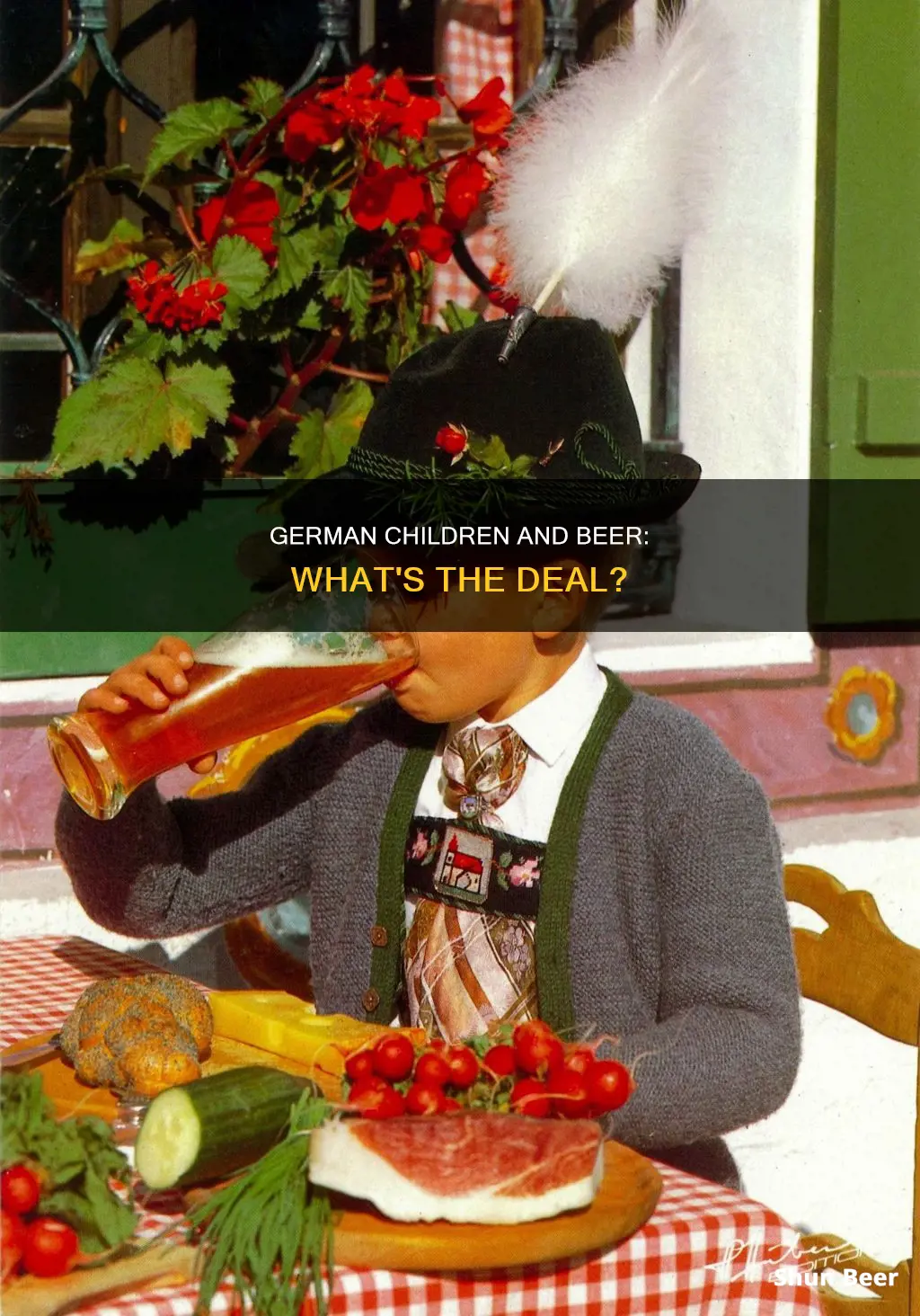
In Germany, the legal drinking age for beer and other low-alcohol drinks is 16. German laws regulating alcohol use and sale are focused on youth protection, intending to teach young people an appropriate approach to alcohol consumption. This has resulted in one of the lowest drinking ages in the world. In recent years, the regulation of accompanied drinking, where 14-year-olds are allowed to consume beer in the presence of a custodial person, has become increasingly controversial, with some politicians calling for its abolition. The rate of teenage drinking in Germany is one of the highest in Europe and the world, which has led to concerns about excessive alcohol consumption among minors.
| Characteristics | Values |
|---|---|
| Drinking age in Germany | One of the lowest in the world |
| German laws regulating alcohol use and sale | Focused on youth protection |
| Alcohol tax rates in Germany | Below average compared to the rest of Europe |
| Alcohol availability regulations in Germany | Very few |
| Public drinking in Germany | Generally legal and considered socially normal |
| Alcohol consumption per capita in Germany in 2016 | Fifth highest worldwide |
| Teenager drinking alcohol in Germany | One of the highest in Europe and the world |
| Alcohol purchase and consumption in public places | Not allowed for children below the age of 16 |
| Minors allowed to consume undistilled alcoholic beverages | Must be in the company and have the permission of a custodial person |
| Minors allowed to consume undistilled alcoholic beverages without parents or custodian | Age 16 |
| Age allowed to consume distilled spirits | 18 |
| Drinking in schools in Germany | Not allowed in high schools |
What You'll Learn

German youth protection laws
In Germany, the laws regulating alcohol use and sale are primarily focused on youth protection. German legislation is relatively lenient compared to other countries and is designed to teach young people an appropriate approach to alcohol consumption. This is reflected in Germany having one of the lowest drinking ages in the world.
The Protection of Young Persons Act (Jugendschutzgesetz or JuSchG) is a federal law in Germany that enforces youth protection in public spaces and regulates media consumption by minors. The act does not apply to minors who are married. The Protection of Young Persons Act covers:
- How long a minor may stay in specific public spaces, such as bars, restaurants, public spaces, events, or establishments that are considered harmful to youth, and gambling establishments.
- The minimum age to sell to and permit minors to consume alcohol in public.
- The minimum age to sell to and permit minors to consume tobacco products and electronic cigarettes in public.
- The age restrictions for games and movies, which must be enforced by cinemas, broadcasters, and stores selling movies and video games.
- Responsibility for the Freiwillige Selbstkontrolle der Filmwirtschaft (FSK) and the Unterhaltungssoftware Selbstkontrolle (USK) to issue age ratings for movies and video games.
- Responsibility of the Bundesprüfstelle für jugendgefährdende Medien (Federal Department for Media Harmful to Young Persons) to index games, movies, or other types of media, and restrict their sale and distribution.
Under the Protection of Young Persons Act, there are three different drinking ages depending on the type of alcoholic beverage and the circumstances:
- At 14 – Minors are allowed to consume and possess undistilled (fermented) alcoholic beverages, such as beer and wine, in public places, bars, or restaurants, as long as they are accompanied and have the permission of a Custodial Person.
- At 16 – Minors are allowed to consume and possess undistilled (fermented) alcoholic beverages without parental supervision or a Custodian.
- At 18 – People are allowed access to distilled spirits, beverages containing distilled spirits, and food products containing non-negligible amounts of distilled spirits.
These limits do not apply to married adolescents.
In Germany, underage drinking in private is not regulated by a specific legal restriction. However, protection from physical and mental harm is part of parents' general obligation to care for a child.
Beer and Flagyl: What You Need to Know
You may want to see also

Drinking culture in Germany
Germany has a unique drinking culture that differs from that of other countries. While German laws regulating alcohol use and sale are focused on youth protection, they are relatively lenient compared to other countries. The legislation is designed to teach young people an appropriate approach to alcohol consumption, which is reflected in one of the lowest drinking ages globally.
In Germany, underage drinking in private is not prohibited by a specific legal restriction. However, parents are responsible for protecting their children from physical and mental harm. The Youth Protection Act differentiates between children (up to 14 years) and adolescents (14-18 years), with varying restrictions on alcohol consumption. Children under 14 are prohibited from buying or consuming alcohol. Adolescents aged 14 and 15 can drink beer, wine, or sparkling wine in the presence and with the permission of their parents or a custodian. At 16, they can consume these beverages without supervision, while the legal drinking age for distilled spirits is 18.
Drinking in public is generally legal and socially accepted in Germany. The country has one of the lowest tax rates for alcoholic beverages in Europe, and alcohol is easily accessible. This accessibility, combined with the low drinking age and lax regulations, has led to Germany being referred to as a "promille paradise". The rate of teenage drinking in Germany is among the highest in Europe and the world. However, it is important to note that German drinking culture values responsible consumption, and getting extremely drunk is generally frowned upon.
The German Centre for Addiction Issues and the German Cancer Research Center have recommended raising the drinking age to 18 for all alcoholic beverages, and public opinion also leans towards stricter regulations. Despite these concerns, Germany's drinking culture remains an integral part of its society, with alcohol consumption deeply rooted in traditions and social customs.
Wine vs Beer: Which is the Healthier Drink?
You may want to see also

Alcohol availability in schools
In Germany, the laws regulating alcohol use and sale are primarily focused on youth protection. German alcohol legislation is relatively lenient and is designed to teach young people an appropriate approach to alcohol consumption, rather than to keep them away from it entirely. This approach is reflected in Germany having one of the lowest drinking ages in the world.
Under German law, children under the age of 14 are not allowed to buy or drink alcohol. Teenagers who are 14 or 15 are permitted to drink beer, wine, or sparkling wine, but only in the presence and with the permission of their parents or a custodial person. Adolescents aged 16 and over are allowed to buy and consume beer, wine, or sparkling wine without parental supervision, but other alcoholic drinks are off-limits for them. At 18, a person is considered an adult in Germany and can purchase and consume any alcoholic beverage freely.
These laws apply to alcohol availability in schools as well. In most German schools, alcoholic beverages are not sold or served to students, as a majority of high school students are below the drinking age. However, in universities and Berufsschulen, where most students are adults, beer may be available in cafeterias and vending machines. While there is no legal restriction on students of legal drinking age consuming beer during lunch, it is not socially customary, and doing so would attract disapproving looks.
In Germany, underage drinking in private is not regulated by specific legal restrictions. However, protection from physical and mental harm is part of parents' general obligation to care for their children. Schools also play a role in protecting minors from the harmful effects of alcohol. They are required to follow the Protection of Young Persons Act, which prohibits the sale or service of alcoholic beverages to underage individuals. Schools may also offer children discos or teen discos, special events where students can dance and socialize without alcohol being served, and with adults present to supervise.
Baclofen and Beer: Is It Safe to Mix?
You may want to see also

Parental responsibility
In Germany, the legal drinking age for undistilled (fermented) alcoholic beverages, such as beer and wine, is 16. However, the country's laws allow 14 and 15-year-olds to drink these beverages in the presence and with the permission of their parents or a custodial person. This is known as "accompanied drinking" and is considered controversial by some.
While German laws regulating alcohol use and sale are lenient compared to other countries, parents still have a responsibility to protect their children from physical and mental harm. This includes teaching them about appropriate alcohol consumption.
- Educate your children about alcohol: It is important that children understand the effects of alcohol on their bodies and the potential risks associated with drinking. Parents should talk openly and honestly about alcohol, providing age-appropriate information.
- Model responsible drinking behaviour: Children learn by observing their parents. If you choose to drink alcohol, do so in moderation and explain to your children why you are limiting your intake. Avoid getting drunk, especially regularly, as this can normalise excessive drinking for your children.
- Set clear rules and boundaries: Communicate your expectations and the consequences of breaking the rules. For example, you may set a rule that your child is not allowed to drink alcohol until they reach the legal age.
- Provide alternatives: Offer non-alcoholic beverages at family gatherings or events where alcohol is present. This can help children understand that there are other options and that alcohol is not necessary for socialising or enjoyment.
- Monitor your child's activities and friends: Be aware of your child's social circle and their access to alcohol. Talk to other parents to ensure they share similar values and rules regarding alcohol.
- Seek professional help if needed: If you are concerned about your child's alcohol consumption or if they are struggling with addiction, don't hesitate to reach out to healthcare professionals or support services. Early intervention can make a significant difference.
While German culture may be more accepting of alcohol consumption, parental responsibility remains crucial in teaching children about moderation and making informed choices. It is important to remember that the legal drinking age is still in place for a reason, and parents play a vital role in ensuring their children's health and well-being.
Beer and Keto: What You Need to Know
You may want to see also

Drinking age in Germany
Germany has one of the lowest drinking ages in the world. The country's laws regulating alcohol use and sale are mostly focused on youth protection, but they are relatively lenient compared to other countries. The legislation is intended to teach young people an appropriate approach to alcohol consumption rather than keeping them away from it entirely.
In Germany, the legal drinking age depends on the type of alcoholic beverage and the circumstances in which it is consumed. Here are the key points regarding the drinking age in Germany:
- At 14: Minors are allowed to consume and possess undistilled (fermented) alcoholic beverages, such as beer and wine, in public places, bars, or restaurants, as long as they are accompanied and have the permission of a custodial person. This regulation is called "accompanied drinking" and has become increasingly controversial, with some politicians calling for its abolition.
- At 16: Minors can consume and possess undistilled alcoholic beverages without parental supervision or a custodian.
- At 18: Individuals are allowed access to distilled spirits and beverages containing distilled spirits, including food products with non-negligible amounts of distilled spirits.
Other Regulations and Cultural Norms
In addition to the drinking age regulations, here are some other key points about alcohol consumption in Germany:
- Underage drinking in private is not specifically restricted by law, but protection from physical and mental harm is part of parents' general obligation to care for their children.
- The Protection of Young Persons Act regulates selling alcohol and permitting minors to consume alcohol and tobacco products in public.
- Drinking in public is generally legal and considered socially normal.
- Germany has a relatively low taxation rate for alcoholic beverages compared to the rest of Europe.
- The country has a tradition of "Feierabendbier" (end-of-work beer), and drinking beer in public is not only legal but also common.
- Toasting is considered crucial in German drinking culture, and Germans tend to toast frequently and for various reasons.
- Germany has a rich variety of regional beer varieties, each with its own unique characteristics and traditions.
- The country also offers non-alcoholic and low-alcoholic beverages, which are becoming increasingly popular.
Beer Drinking: A Risk Factor for Stomach Cancer?
You may want to see also
Frequently asked questions
The legal drinking age in Germany is 16 for beer and other low-alcohol drinks.
Children under the age of 14 are not allowed to buy or drink alcohol in Germany. Teenagers who are 14 or 15 are allowed to drink beer, wine, or sparkling wine only in the presence and with the permission of their parents or another person in a custodial role.
Beer is not sold in German high schools. However, in universities, it is not uncommon to find beer in the cafeteria or in vending machines.
In licensed premises, at points of sale, or elsewhere in public places, beer, wine, wine-like beverages, or sparkling wine must not be sold to children below the age of 16 years.
Non-alcoholic beer is very common in Germany. There is zero stigma attached to drinking it.







